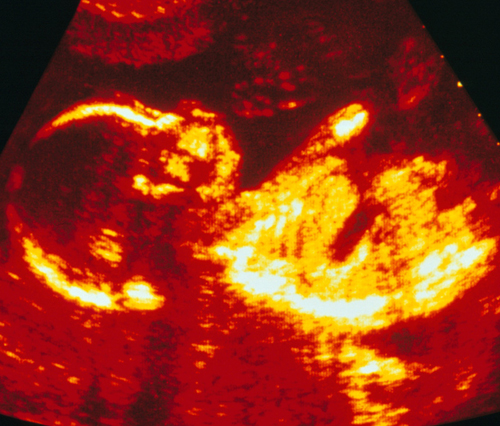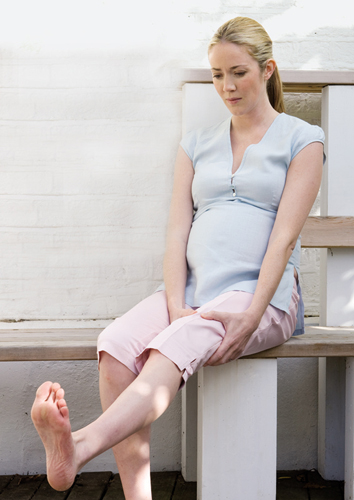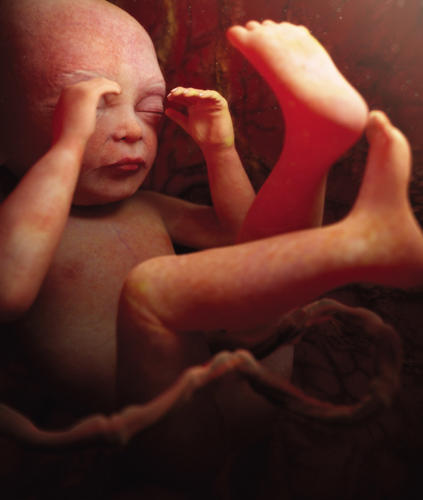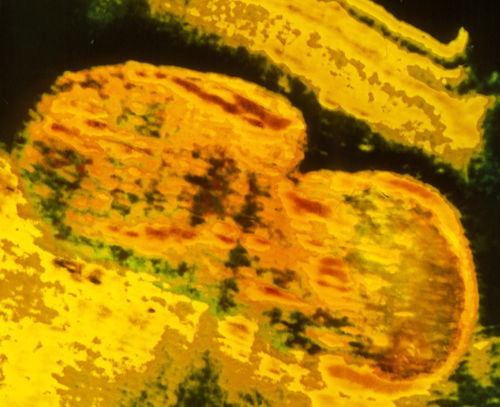You are 23 Weeks and 2 Days 117 days to go…
With a layer of fat and a tough layer of cells, your baby’s skin is now becoming more resilient.
Your baby today
You will probably be aware of your baby’s movements by now: the
number of movements and their nature will vary during the day and night
and you may notice that they start to form into a particular pattern or
respond to your own activity.

Your baby’s skin is continuing to develop
and has now started to “keratinize.” Keratin is the substance that
transforms the skin’s outer layer into a protective layer of dead cells.
Hair and nails also form from keratin.
The outer keratinized
layer of skin cells, plus a layer of fat laid down between the skin
cells, gives the skin a waterproof covering. This process of
keratinization reduces the amount of water your baby loses into the
amniotic fluid. Each new skin cell, made in the deepest part of the
skin, matures as it gradually moves up toward the surface and, now
keratinized, becomes part of the outer protective layer before it is
eventually shed. The cycle takes approximately 30 days.
The thickest layers
of keratinized cells are on the palms of the hands and the soles of the
feet. The keratinizing process has only just begun. Since the fat layer
is very thin at this stage, your baby’s skin will still appear
translucent, but less so than it did in earlier weeks. At this stage of
pregnancy, your baby still has plenty of room to maneuver inside the
uterus, and although you’re likely to be feeling lots of movements by
now this will only be a fraction of the total. This is because the only
movements you’ll feel are those that cause your baby to kick or bump
into the wall of your uterus. You will be unaware of many of the finer
movements that are performed close to the baby’s body since they won’t
make any contact with your uterus.
Coping with leg cramps
Getting painful spasms in the leg muscles
is common in pregnancy, particularly at night. You may find that you
wake up due to the sudden and severe localized pain in your legs or
feet. This is thought to be due to the pressure of the uterus on the
pelvic nerves.
Some experts
believe that cramps during pregnancy may be caused by a lack of calcium
or salt or an excess of phosphorus, but these theories are as yet
unproven.
When you get a spasm, relieve it by flexing your foot or leg (see image),
and gently massaging the affected area. The cramp should resolve itself
once you are out of bed and using the muscle. However, if the pain
doesn’t recede and there is any reddening or swelling in the leg, you
should seek medical advice immediately to eliminate the possibility of a
clot , since this can be dangerous.
To reduce the incidence of
cramps or its severity, drink lots of water to prevent dehydration and
regularly do leg stretches (see image) and ankle exercises, circling your heel and wiggling your toes.
Getting gentle
exercise, such as walking or swimming, can also help, as can regularly
massaging the calf muscle to improve circulation.
Gently flex your foot to relieve cramps in the calf muscle. Alternatively, do a calf stretch.

Your baby’s bones
are hardening and her arms and legs are beginning to flesh out. She
brings her hands to her face often. Her skin is starting to develop a
protective outer covering of vernix.

You are 23 Weeks and 3 Days 116 days to go…
Are you feeling hot? Being pregnant can sometimes feel as though you have your own personal radiator strapped to you.
Your baby today
Ultrasound uses sound waves of a very high frequency, well
beyond the audible range of the human ear, so your baby’s hearing will
be completely unaffected by the sound waves transmitted during these
scans that check her growth and development.

You may find that you’re much hotter
and sweating more than normal during pregnancy. This is because you’re
carrying more weight than usual and you have more blood pumping around
your body.
If you’re pregnant during the summer, this can be difficult to bear, so find ways to stay cool .
If you’re pregnant in the winter, you may find yourself walking down
the street in a light sweater while other people are all bundled up in
coats and scarves. You might get into debates with your partner if he
wants the heat on and you want the windows open!
Make sure you drink
enough fluid throughout the day. You might find that the increased sweat
causes a rash in the creases under your breasts or in your groin, so
wash frequently and make sure that you dry these areas well.
Hot flashes can be worse at night, so pack away your pajamas for a few months and get naked.

It’s common to dream that you give birth to an older baby, who is born walking and talking!
This is thought to
reflect a mother-to-be’s insecurities about caring for a tiny, helpless
baby. The older the baby, the more self-sufficient she appears.
… Doctor
| Q: |
I keep having really strange and vivid dreams. Is this normal in pregnancy?
|
| A: |
Yes, when you’re pregnant, it’s common to dream more and to
remember your dreams. Experts attribute the vividness of these dreams to
all the emotional and physical changes a pregnant woman is going
through.
The vivid
dreams may be a way for your unconscious to deal with all the hopes and
fears you may have about your unborn baby and impending motherhood.
The increase is also
believed to be due to hormonal changes: increased levels of estrogen are
thought to cause longer periods of REM (rapid eye movement) sleep—the
phase of sleep in which we are most likely to dream.
If your dreams are disturbing, try writing them down to get them off your mind. |